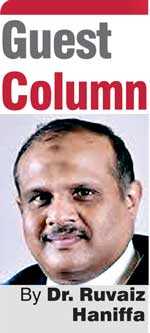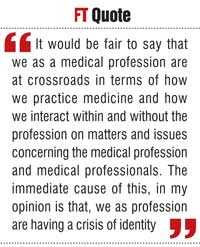Monday Feb 23, 2026
Monday Feb 23, 2026
Tuesday, 11 September 2018 00:00 - - {{hitsCtrl.values.hits}}
The following article is based on Sri Lanka Medical Association President Dr. Ruvaiz Haniffa’s message to SLMA’s August 2018 newsletter
Dear Member, your Council has completed more than half its term in elected office as we begin the month of August 2018. I think this is an opportune juncture to reflect upon what the SLMA set out to do at the beginning of the year and look towards the future from the perspective of the SLMA and Sri Lankan medical professions and medical professionals at large.
On the day I was elected as President of the SLMA on 15 December 2017 in my acceptance speech I noted that our profession would face challenges which could have an impact on how we practice medicine in Sri Lanka. Also in my message as President to the SLMA Website I note, ‘Our founders deemed it fit to adopt ‘Lankadipassa Kiccesu Ma Pamajii’ (to act without delay for the betterment of our nation) as our motto, fully cognisant of the leadership role the SLMA is expected to play as the leading medical organisation in the country representing all grades and all specialties of doctors from both the State as well as the private sectors.
This milieu gives the SLMA its greatest asset; diversity within the medical profession, which enables it to capture and represent the widest and broadest possible ideas, views, concerns and expectations of the Sri Lankan medical profession. It is a fact that many generations of members of the SLMA have contributed to preserve, sustain and enrich this uniqueness.
The health and healthcare scenario and what our patients expect from us as doctors and what we as doctors expect from our national medical association has changed over time. This is of course the way to go. This has necessitated a change in the role of doctors and national medical associations.
The SLMA has been able to adapt itself to the changing expectation of its members and thereby be relevant to them over the past 131 years. The challenges we as members of the SLMA face today will be to institute mechanisms to ensure our significance to our future members while preserving our undisputed role as the academic, professional, moral and ethical guardian of the Sri Lankan medical profession. It is in achieving this objective that each and every member of the Sri Lankan medical profession, whether he or she is a member of SLMA or not, has an obligation to become a part of’.
It would be fair to say that we as a medical profession are at crossroads in terms of how we practice medicine and how we interact within and without the profession on matters and issues concerning the medical profession and medical professionals. The immediate cause of this, in my opinion is that, we as profession are having a crisis of identity.
The underlying cause of this crisis I believe began several decades ago with the dramatic transformation of Sri Lankan society in terms of economic and technological advancement. This transformation necessitated that the medical profession/professionals also transform to keep pace with the economic and technological demands of society. In Sri Lanka, this transformation (or lack of it) occurred at best in an ad hoc manner. This ad hoc transformation (or lack of it) did not take a holistic view of the ideas, concerns and expectations of the various medical professional stakeholders and general public who we as professionals are committed to serve.
In an article titled ‘Against Identity Politics: The New Tribalism and Crisis of Democracy’ in the September/October 2018 issue of the journal Foreign Affairs Francis Fukuyama, Olivier Nomellini Senior Fellow at the Freeman Spogli Institute for International Studies at Stanford University, states: ‘Most economists assume that human beings are motivated by the desire for material resources or goods. This concept of human behaviour has deep roots in Western political thought and forms the basis of most contemporary social science. But it leaves out a factor that classical philosophers realised was crucially important: the craving for dignity. Socrates believed that such a need formed an integral ‘third part’ of the human soul, one that coexisted with a ‘desiring part’ and a ‘calculating part’. In Plato’s Republic, he termed this the thymos, which English translations render poorly as ‘spirit’. Thymos is expressed in two forms. The first is what I call ‘megalothymia’: a desire to be recognised as superior. Pre-democratic societies rested on hierarchies, and their belief in the inherent superiority of a certain class of people-nobles, aristocrats, royals – was fundamental to social order. The problem with megalothymia is that for every person recognised as superior, far more people are seen as inferior and receive no public recognition of their human worth. A powerful feeling of resentment arises when one is disrespected. And equally powerful feeling – what I call ‘isothymia’ – makes people want to be seen as just as good as everyone else.’
In the same article Fukuyama further states (and I have para phrased here a bit): ‘The medical profession needs to protect marginalised and excluded groups, but they also need to achieve common goals through deliberation and consensus. The shift of focus in the agendas of various fragmented groups within the medical profession in Sri Lanka towards protection of narrow group identities ultimately threatens that process. The remedy is not to abandon the idea of identity, which is central to the way that modern people think about themselves and their surrounding societies; it is to define larger and more integrative national medical identities that take in to account the de facto diversity of the entire Sri Lankan medical profession/professionals.’
Fukuyama concludes his article thus: ‘Fears about the future are often best expressed through fiction, particularly science fiction that tries to imagine future worlds based on new kinds of technology. In the first half of the twentieth century, many of those forward- looking fears centred on big, centralised, bureaucratic tyrannies that snuffed out individuality and privacy: think George Orwell’s 1984. But the nature of imagined dystopias began to change in the later decades of the century, and one particular strand spoke to the anxieties raised by identity crisis. So-called cyberpunk authors such as William Gibson, Neal Stephenson and Bruce Sterling saw a future dominated not by centralised dictatorships but by uncontrolled social fragmentation facilitated by the internet. The good thing about dystopian fiction is that it never comes true. People today can imagine their countries as better places that support increasing diversity and yet that embraces a vision for diversity can serve a common purpose. People will never stop thinking about themselves and their societies in identity terms. But peoples’ identities are neither fixed nor necessarily given at birth. Identities can be used to divide, but it can also be used to unify. That, in the end, will be the remedy for the identity crisis of the Sri Lankan medical profession/professionals.’
It is obvious that we as a profession/professionals are moving towards the opposing dystopias of hyper centralisation and endless fragmentation. As the apex national professional medical body representing all grades of doctors both in the State and private sector in Sri Lanka the SLMA needs to play a role to steer the profession/professionals towards a utopia rather than a dystopia. We need to act together without delay for the betterment of the profession and keep true to our motto ‘Lankadipassa Kiccesu Ma Pamajii’ (to act without delay for the betterment of our nation).
(The writer is President, SLMA.)